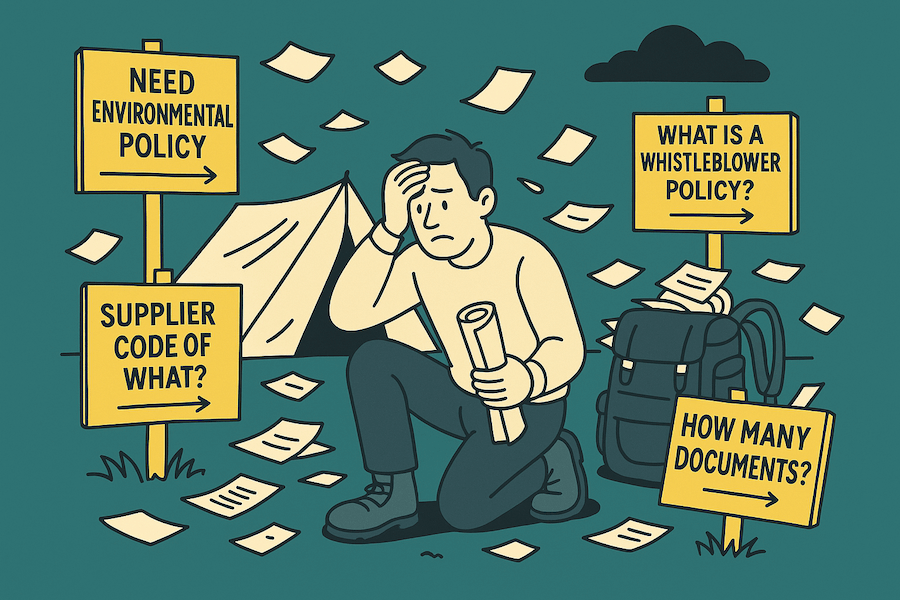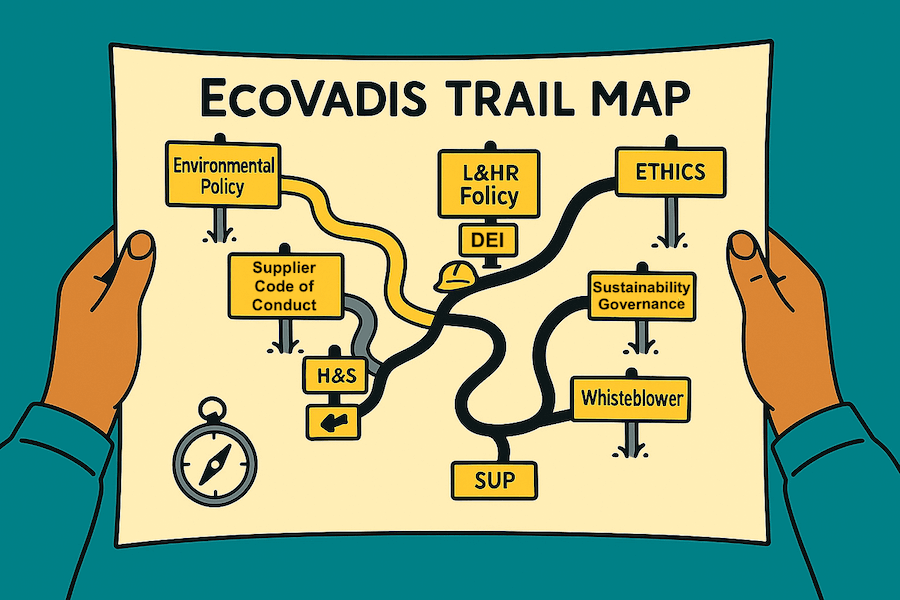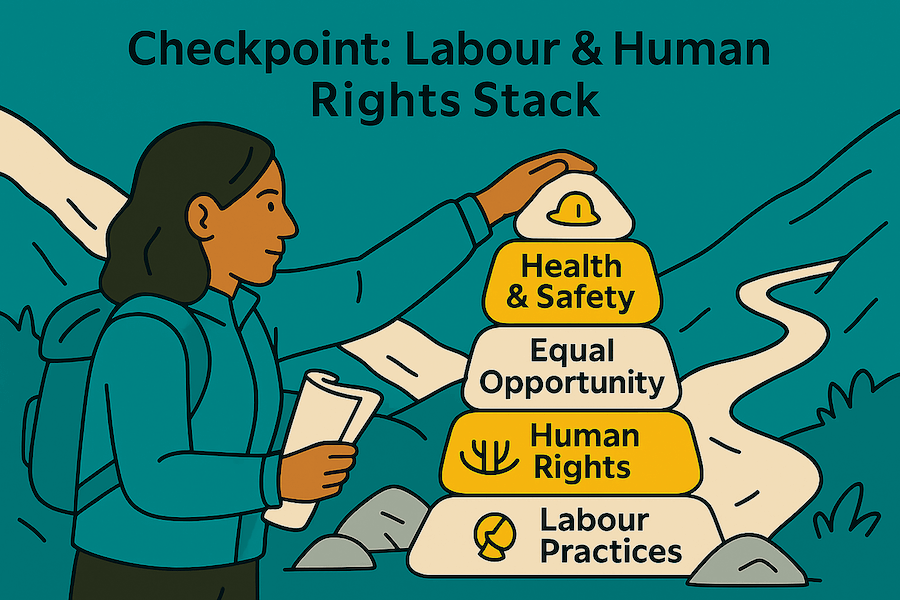Starting from Scratch? Essential EcoVadis Policies & How to Create Them Quickly
Sep 01, 2025
Updated: 1 September, 2025
Facing your first EcoVadis assessment can feel overwhelming, especially the thought of writing EcoVadis policies if you don't have them already. For many, policy writing is a pain point. How to create them from scratch? But here's the good news: creating the essential sustainability policies EcoVadis looks for doesn't have to be a monumental task.
EcoVadis views formal, documented policies as the bedrock of your sustainability management system. They are tangible proof of your commitments. This guide will show you which Ecovadis policies matter for your submission, how to approach their creation quickly and effectively, and leverage Ecovadis policy examples and Ecovadis policy templates to get a head start.

Before you dive in, a quick note on teamwork: creating and gathering these documents is rarely a one-person job. You'll likely need to collaborate with colleagues from various departments, including:
- Human Resources: For policies related to labour and human rights, health and safety, and employee training.
- Procurement: For your Supplier Code of Conduct and Sustainable Procurement policy.
- Legal and Compliance: For your Code of Ethics, anti-corruption policies, and data protection.
- Operations/Facilities: For environmental data and procedures.
Building these relationships early will make the entire EcoVadis process much smoother.
Quick Navigation
- 1. Why Policies are Your EcoVadis Starting Point
- 2. What Are the "Must-Have" Policies for an EcoVadis Submission?
- 3. What Belongs in a Foundational Environmental Policy?
- 4. Which Policies Are Needed for the Labour & Human Rights Theme?
- 5. What Policies Form a Strong Ethical Framework?
- 6. Why is a Supplier Code of Conduct Essential for EcoVadis?
- 7. How Can We Create Effective Policies Quickly?
- 8. EcoVadis Policy FAQ
Why Policies are Your EcoVadis Starting Point
To demonstrate your company's intent and governance, you need formal policies. They are the foundation of your sustainability management system and the first part of the Policies, Actions, and Results (P-A-R) framework that EcoVadis uses to score you. For a deeper dive, you can read our guide on the EcoVadis methodology, but the key takeaway is this: strong policies carry a significant weight of 25% in each theme and are the best place to start.
What Comes After Policies?
Policies are just the beginning. To earn a high score, they must be verified with two other key elements:
- Actions: The concrete steps you take to implement your policies, like training programs, certifications, or risk assessments.
- Results: The KPIs and data that prove your actions are effective, like your GHG emissions data or employee turnover rates.
EcoVadis requires policies to be:
- Relevant: Addressing your company's specific impacts and the activated criteria in your questionnaire.
- Up-to-Date: Typically reviewed within the last 8 years, though more frequent reviews are best practice.
- Credible & Official: Company-branded, formally dated, and signed/endorsed by senior management. Documents created solely for the assessment without real internal adoption are often flagged.
Beyond your documentation, EcoVadis also verifies your company's credibility through its 360° Watch Findings. Analysts scan public sources like news articles and NGO reports for information on your performance. This means your public perception matters, and a strong set of sustainability management systems is your best defense against negative findings.
What Are the "Must-Have" Policies for an EcoVadis Submission?

While EcoVadis tailors its questionnaire, a core set of documents is generally expected to demonstrate a foundational sustainability management system. These cover the four key themes:
Feeling overwhelmed by the list? The EcoVadis Starter Pack provides ready-to-customise templates for these essential policies, helping you build your foundation in days, not months. Learn more about the Starter Pack.
Let's break these down.
What Belongs in a Foundational Environmental Policy?
- EcoVadis Importance: Addresses the Environment theme, covering energy, GHG emissions (Scope 1-3), water, waste, pollution, and biodiversity and more.
- Essential Components:
- Clear commitment to environmental protection, legal compliance, and continuous improvement.
- Specific objectives for key areas (energy, water, waste, emissions).
- Assigned roles and responsibilities.
- Commitment to regular review and top management endorsement.
- "EcoVadis in Reverse" Example: Waaree Energies' "Environmental Policy (DOC-WEL-POL-01)" is a public example, detailing commitments and specific 2025 and 2030 targets across Energy Efficiency, Air Pollution, Waste, Carbon Emissions, Water and more.
📌 Quick Tip
Start with a general commitment and identify your top 2-3 environmental impacts. To make your policy more credible, state your intent to set quantitative targets.
For example, a SMART goal would be: "We will reduce our Scope 1 and 2 greenhouse gas emissions by 15% by 2028, against a 2024 baseline."
Which Policies Are Needed for the Labour & Human Rights Theme?
This theme is critical and often requires a few interconnected Ecovadis policies.
Comprehensive L&HR Policy (Umbrella)
- EcoVadis Importance: Provides an overarching framework for your commitment to worker well-being and human rights.
- Essential Components:
- Commitment to international standards (ILO Core Conventions, UN Guiding Principles).
- Coverage of H&S, working conditions, social dialogue, career management, prohibition of child/forced labour, and DEI.
- Accessible grievance mechanisms.
- "EcoVadis in Reverse" Example: FineToday Group's "Human Rights Policy" aligns with UN Guiding Principles and covers their value chain.
📌 Quick Tip
Use this as a parent document, referencing more detailed H&S or DEI policies. When setting goals, aim for measurable (SMART) targets to show commitment.
For example: "We will increase employee satisfaction scores by 10% by the end of 2026, as measured by our annual employee survey."
Robust Health & Safety (H&S) Policy
- EcoVadis Importance: A heavily weighted aspect, especially for operational/manufacturing businesses (but usually already in place in companies).
- Essential Components:
- Commitment to a safe workplace and accident prevention.
- Process for risk assessment and hazard control.
- Emergency preparedness procedures.
- Incident reporting and investigation.
- Employee training and consultation on H&S.
- "EcoVadis in Reverse" Example: Gerresheimer AG demonstrates a target-driven approach to Health & Safety that is integrated into its corporate strategy through its Group Occupational Safety Policy, building a safety culture through awareness campaigns, setting a 80% Lost Time Incident Rate (LTIR) reduction target by 2028, and deciding to achieve 100% certification of its production sites to ISO 45001 by 2025 (with 94% already certified by 2024).
📌 Quick Tip
Structure your policy around ISO 45001 clauses for a best-practice framework. To strengthen it, add a measurable (SMART) target.
For example: "We will reduce our Lost Time Incident Rate (LTIR) by 20% by the end of 2027, compared to our 2024 baseline."
Effective Equal Opportunity Policy
- EcoVadis Importance: Demonstrates commitment to non-discrimination, fairness, and an inclusive workplace.
- Essential Components:
- Clear prohibition of discrimination and harassment (list protected characteristics).
- Commitment to equal opportunities in recruitment, promotion, and pay.
- Confidential grievance channels for issues related to discrimination and harassment, with non-retaliation clauses.
- "EcoVadis in Reverse" Example: Scott Bader demonstrates leadership here as one of the first ISO 30415 certificate holders for D&I and transparent UK Gender Pay Gap Report.
📌 Quick Tip
List all prohibited grounds for discrimination relevant to your region. To demonstrate proactive commitment, include a measurable (SMART) target.
For example: "We will increase the representation of underrepresented groups in leadership positions by 15% by 2028."

What Policies Form a Strong Ethical Framework?
Ethics is foundational to trust and a strong EcoVadis score.
Overarching Code of Ethics / Business Conduct
- EcoVadis Importance: Sets the overall ethical tone and guiding principles for the entire organisation.
- Essential Components:
- CEO/Leadership message emphasising commitment to integrity.
- Core company values (honesty, fairness, respect).
- Compliance with laws.
- Guidelines on conflicts of interest, fair dealing, and use of company assets.
- Summary of anti-corruption, data protection, and whistleblowing principles (can link to specific policies).
- "EcoVadis in Reverse" Example: FineToday Group's "Code of Conduct and Ethics" is comprehensive and available in multiple languages, a best practice for global companies. It is "signed" by the CEO, has a clear scope, and is organised around the company's relationship with its key stakeholders.
📌 Quick Tip
Use this as an umbrella to introduce more specific ethics policies and get top management to sign it. Include a measurable (SMART) training goal to demonstrate implementation.
For example: "We will achieve 100% completion of annual ethics training by all employees by December 31st each year."
Specific Anti-Corruption Policy
- EcoVadis Importance: Addresses bribery, fraud, and other corrupt practices – a high-risk area.
- Essential Components:
- "Zero Tolerance" statement for all forms of bribery and corruption.
- Clear definitions (bribery, facilitation payments, gifts).
- Rules for gifts, hospitality, and an explicit prohibition of facilitation payments.
- Requirements for due diligence on third parties.
- Commitment to accurate books and records.
- "EcoVadis in Reverse" Example: Ansell Limited's Anti-Bribery & Corruption Policy reinforces their zero-tolerance stance by explicitly prohibiting kickbacks, improper payments, and facilitation payments. This document is publicly accessible on their Governance webpage, which serves as a good demonstration of how your company could approach transparency and a well-structured ethical framework.
📌 Quick Tip
Be unequivocal about prohibiting bribery and facilitation payments. A strong policy includes a measurable (SMART) training target.
For example: "We will conduct annual anti-corruption training for 100% of relevant employees and achieve a 95% understanding score on post-training assessments."
Clear Whistleblower Policy
- EcoVadis Importance: Essential for enabling safe reporting of misconduct and demonstrating accountability.
- Essential Components:
- Encouragement to report suspected wrongdoing.
- Multiple, accessible, and confidential reporting channels (e.g., dedicated email, hotline).
- Crucially: A strong, explicit non-retaliation clause.
- Outline of the investigation process.
- "EcoVadis in Reverse" Example: Scott Bader's "Group Whistleblowing Policy" is a clear, publicly available document detailing their process and use of an external hotline, "Safecall."
📌 Quick Tip
The non-retaliation clause is non-negotiable and at least one reporting channel must offer anonymity. Add a measurable (SMART) target for accountability.
For example: "We will ensure 100% of reported whistleblower concerns are investigated within 30 days of receipt."
Essential Data Protection / Information Security Policy
- EcoVadis Importance: Critical for "Responsible Information Management," especially with GDPR and other privacy laws.
- Essential Components:
- Commitment to protecting confidentiality, integrity, and availability (CIA) of data.
- Compliance with relevant data privacy laws (e.g., GDPR).
- Principles for access control and secure data handling.
- Procedures for information security incident management.
- Commitment to employee training on data security.
- "EcoVadis in Reverse" Example: ZTE Corporation's Business Code of Conduct is a strong and comprehensive code addressing the protection of data security, privacy, and intellectual property. The document forms the foundation of the company's Information Security and Privacy Management system. This system is externally audited and (3rd-party) certified to ISO 27001 and ISO 27701 standards.
📌 Quick Tip
Align with GDPR principles and focus on secure data handling. Add a measurable (SMART) goal to demonstrate compliance.
For example: "We will achieve 100% compliance with GDPR regulations for all customer data by Q2 2026, as evidenced by internal audits."
Why is a Supplier Code of Conduct Essential for EcoVadis?
- EcoVadis Importance: Acts as the formal rulebook you provide to your suppliers, defining your company's standards and requirements for environmental, social, and ethical performance. For EcoVadis, it's tangible evidence of your actions to manage sustainability issues within your supply chain.
- Essential Components:
- Supplier Expectations (Supplier Code of Conduct elements):
- Ethical Principles: A zero-tolerance stance on bribery and corruption, with clear rules on fair competition and data protection.
- Labour & Human Rights: Prohibition of child and forced labour, alongside requirements for a safe workplace, fair wages, and non-discrimination.
- Environmental Management: Expectations for managing waste, emissions, and water, and for promoting the use of sustainable materials.
- A clause requiring suppliers to formally sign the code.
- Process for supplier selection/evaluation considering sustainability.
- Commitment to supplier engagement, development on sustainability and the right to verify compliance.
- Supplier Expectations (Supplier Code of Conduct elements):
- "EcoVadis in Reverse" Example: Verescence's "Supplier CSR Charter" (French + English version linked) shows detailed expectations across all four themes, mechanisms for enforcement and verification and cascading requirements through the supply chain. Verescence reports having more than 2,400 suppliers with 100% strategic supplier sign-off and 51% of those being signed up to EcoVadis too.
📌 Quick Tip
Make your Code of Conduct a loving document. Integrate it directly into your supplier onboarding process and contracts. To show active management to EcoVadis, include a measurable (SMART) target.
For example: "We will ensure 80% of our tier-1 suppliers have signed and committed to our Supplier Code of Conduct by the end of 2027."

How Can We Create Effective Policies Quickly?
- Use a Standard Structure: For each policy, include: Title, Policy Statement/Purpose, Scope, Definitions (if needed), Commitments/Objectives (qualitative, and quantitative if possible), Roles & Responsibilities, Implementation Mechanisms (briefly), Training & Communication, Monitoring & Review, Version Control & Top Management Endorsement (signature & date).
- Focus on Activated Criteria: Review your EcoVadis questionnaire to see which criteria are most relevant ("activated") for your company. Prioritise detailed policy content for these areas.
- Leverage Existing Materials (Carefully!): If you have informal guidelines or procedures, formalise them. If you use external Ecovadis policy templates (like those in the Starter Kit), thoroughly customise them to reflect your company's actual practices, risks, and commitments. Generic, unadapted templates are easily spotted and devalued by EcoVadis.
📝 Key Takeaways
- Policies are Foundational: They represent 25% of your score in each theme and are the bedrock of your sustainability management system.
- Credibility is Non-Negotiable: All policies must be formal, company-branded, and endorsed (signed) by senior management to be accepted by EcoVadis.
- Customise, Don't Copy: Use templates for structure, but ensure the content reflects your company's specific risks, commitments, and actual practices.
Build Your Policy Foundation in Days, Not Months
This guide shows you what's needed, but writing policies from scratch is hard. The EcoVadis Starter Kit gives you ready-to-customise templates for the 6 most essential policies, helping you build a submission that meets analyst expectations.
EcoVadis Policy FAQ
Why are policies a crucial starting point for an EcoVadis assessment?
Policies are the bedrock of your sustainability management system. They are tangible proof of your company's commitments, form the "Plan" in the Plan-Do-Check-Act cycle, and carry a significant weight of 25% in the scoring for each of the four EcoVadis themes.
What are the 'must-have' policies for a foundational EcoVadis submission?
A core set of documents is expected. This includes an Environmental Policy; a suite for Labour & Human Rights (L&HR Policy, Health & Safety Policy, Equal Opportunity Policy); an ethical framework (Code of Conduct, Anti-Corruption, Whistleblower, Data Protection); and a Supplier Code of Conduct for Sustainable Procurement.
Which specific policies are needed for the Labour & Human Rights (L&HR) theme?
The L&HR theme typically requires a suite of three interconnected policies: a comprehensive umbrella L&HR Policy covering international standards, a robust Health & Safety (H&S) Policy focused on accident prevention, and an effective Equal Opportunity Policy to ensure non-discrimination.
What is the role of a Supplier Code of Conduct in an EcoVadis assessment?
The Supplier Code of Conduct is the formal rulebook you provide to your suppliers. It defines your company's standards for their environmental, social, and ethical performance and acts as tangible evidence that you are actively managing sustainability issues within your supply chain.
What are some quick tips for creating effective EcoVadis policies from scratch?
To create policies quickly and effectively, use a standard structure for each document, focus on the criteria EcoVadis has "activated" for your company, ensure senior management formally approves and signs them, and thoroughly customise any templates to reflect your actual company practices.
About the Author
Rutger founded Double Your Sustainability to answer one key question: how can companies navigate the complexities of the EcoVadis assessment with confidence? He draws on 15 years of corporate sustainability experience and the direct lessons learned from achieving EcoVadis Platinum medals and supporting companies to provide clear, actionable roadmaps that demystify the process.
As a certified EcoVadis Solutions Practitioner with an MSc. in Strategic Sustainable Development, his focus is on turning your sustainability efforts into a scorecard you can be proud of.
